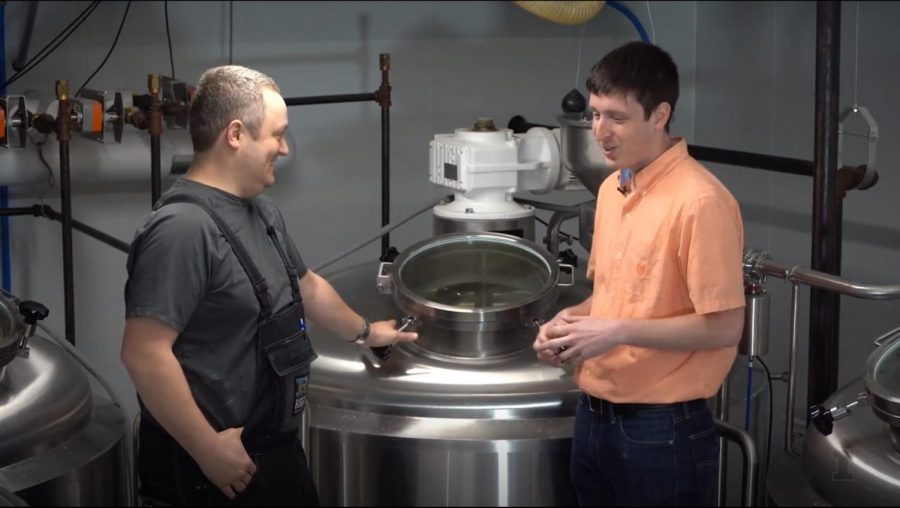Instructors bring wine, food to classroom
FSHN 175 Teaching Assitsant Max Holle (right) takes an on-site tour of Riggs Beer Company with Darin Riggs (left) for a video for his class.
May 6, 2020
Since the COVID-19 pandemic sent University students home, Max Holle, teaching assistant for FSHN 175: Science of Fermented Foods and doctoral candidate in ACES, has had to respond to a lot more student emails.
While all courses at the University switched to an online format, some, like Holle’s FSHN 175 class, were already formatted to be held online.
FSHN 175 teaches students about the science of fermented food. Holle, along with his adviser Michael Miller, work to introduce students to bacterial fermentation in the first half of the semester: yogurt, cheese and pickles. The class then switches to yeast fermentation inside beer, wine, whiskey and bread in the second half.
FSHN 175 is unique because although it is a base course for the major, a majority of the students are not food science majors.
“Our course has a lot of people who are not FSHN majors,” Holle said. “But what they’re able to see is that some of the things that they bring to the table from their different disciplines, whether it’s history or computer science, they can apply some of those same skills to food science and food microbiology.”
Get The Daily Illini in your inbox!
The course acts as an introduction to the fermentation process in that it provides base knowledge to be further built upon.
“A lot of the skills that they learn about in our course can set a platform for moving forward,” Holle said. “It’s the same skills you would learn in a really basic microbiology class, but we hope to cement the same skill set and knowledge through more applied direction.”
In 2018, the College of ACES offered a course development grant to advisers. Holle and Miller began building a course structure and submitted their proposal for FSHN 175. Once the proposal was passed, Miller spent a semester filming and teaching the course work in front of a green screen. Holle spent a semester visiting various local fermentation operations such as Praire Foods Farm and Creamery, where he filmed on-site tour videos to take students through the fermentation process at a professional level.
The way in which Miller and Holle developed the course allowed it to be taught asynchronously online. Each week, a lecture video is released for students to view. However, Holle had to make quick adjustments when students were sent home.
“COVID-19 has forced a lot of students to go back to their homes where they don’t necessarily have the internet capacity to watch the videos or access the quizzes,” Holle said.
Recently, home technology issues have created problems for students trying to access the lecture videos and weekly quizzes on Compass. This required Holle to learn of another format for his students to continue their learning while also giving him clarity on how to be compassionate of students’ circumstances.
“The most important way that we are impacted as instructors is we need to be even more so adaptable,” Holle said. “I try to always give my students the benefit of the doubt, and if they say there’s an issue then I believe that there’s an issue. Just because you’ve been forced into a weird situation, doesn’t mean you shouldn’t be able to take our course.”
For some professors, the COVID-19 pandemic was coincidentally the first time they had offered their class online. For Andrea Faber Taylor, teaching assistant professor in ACES and TA for HORT 100: Introduction to Horticulture, this was the first time she had taught the course online.
Taylor’s first roadblock was the learning activities that she had prepared for her students. These were hands-on activities where students would visit various green spaces around campus such as the greenhouse at the conservatory.
“When COVID-19 came, I had to change all my learning activities to be things that could be done completely online, which was disappointing because some of the assignments were things like visiting the arboretum, which, this time of year, is amazing,” Taylor said.
Visually taking in these spaces accelerates the learning within the course when students are able to physically be in the spaces and work with the materials.
The courses’ mid-semester project, in particular, had to be rewritten, as it involved students visiting a grocery store and exploring the items they work with in class.
“We weren’t under the state of the stay at home order yet, but students were obviously nervous about going to the grocery store,” Taylor said. “So, I had to rewrite that as something that could be done by looking at grocery store websites.”
Taylor uploads weekly lecture videos onto Compass for students to view. As internet connection can be unreliable in some homes, she offers one-on-one zoom meetings for her students.
HORT 100 introduces students to the commercial side of horticulture: food production in a controlled environment. Taylor notes that courses like these at the University are important as the coursework teaches the benefits of being exposed to green spaces and working in them. A fair amount of the aspects of HORT 100 can be applied to benefit one’s life, an aspect Taylor finds extremely useful when teaching.
“As a consumer, you walk away with a little better understanding of where your food and cut flowers come from,” Taylor said. “The fun part for me is that it’s directly applicable to a person’s life.”







